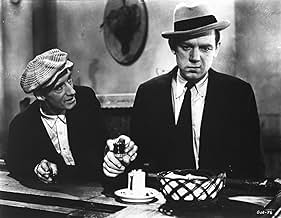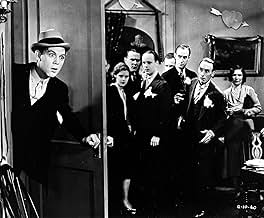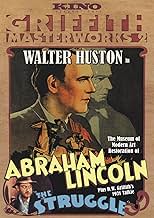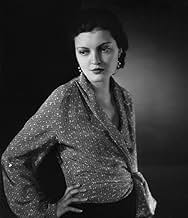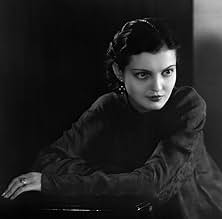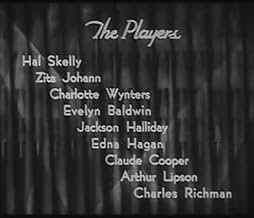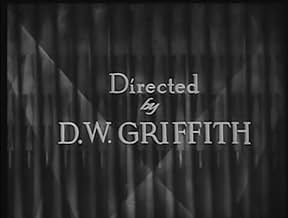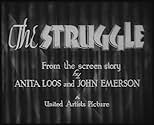Adicionar um enredo no seu idiomaA young couple's marriage is jeopardized by the husband's descent into alcoholism.A young couple's marriage is jeopardized by the husband's descent into alcoholism.A young couple's marriage is jeopardized by the husband's descent into alcoholism.
- Direção
- Roteiristas
- Artistas
Kate Bruce
- Granny
- (não creditado)
Tammany Young
- Barfly
- (não creditado)
- Direção
- Roteiristas
- Elenco e equipe completos
- Produção, bilheteria e muito mais no IMDbPro
Avaliações em destaque
I'm glad to see that the previous comments have been charitable. It's interesting that Griffith was filming the same type of story back in 1909 at Biograph. There are several characteristic Griffith touches in this film -- for instance, the tenderness of the wife when her husband first comes home drunk to her, and in the penultimate scene at his bedside. I'm sorry this picture never had a general release because it is well worth seeing. Chaplin made a silent film as late as 1931; perhaps Griffith should have taken a chance and done that with "The Struggle," because it may have worked better as a silent. References are made to the early days of Griffith's career in the opening scenes of the film; 1911 would seem to have been more remote to a 1931 audience than, perhaps, 1987 seems to us today. A fascinating film.
D.W. Griffith's final film is a talkie remake of a silent short made early in his career. It's a morality play about a man's struggle with alcoholism. Interesting subject matter, ahead of its time in some ways, but probably not the kind of thing Depression-era audiences were looking to see to escape from their troubles. Today, it's a real creaker but has a lot to recommend about it. Hal Skelly, who had a short film career before dying in a tragic car/train collision in 1934, gives an impressive performance in the lead. Zita Johann, a year away from her biggest movie role in The Mummy, makes her film debut here. She gives a subtle turn as the put-upon wife (the last of Griffith's heroines who have it rough because of the crappy men in their life). Edna Hagan, who plays Skelly and Johann's daughter, is also really good. It's a fine movie, although not without its flaws. The ending is the biggest negative, in my opinion. I can overlook the creaks and groans but I don't care for happy endings when they feel unearned. Everything in the film up to that point screamed tragedy. It just felt like a cop-out.
Griffith's title of this movie lives up to what he must have gone through to get the movie made. It's a story that he could've easily made in the midst of the silent era circa 1913. It moves like his Biograph shorts, just with sound. Zita Johann is so 'Alice Joyce-like' in her performance that is the sympathetic-understanding wife type. Why doesn't she just take the daughter and leave Hal Skelly one would ask?
The later parts of the film pick up steam as opposed to the earlier parts. A group of children taunt Kelly in the street after his descent into alcoholism and loss of his job. Griffith meant to show the kids as cruel but they are more cute than malevolent. They are dressed like they are readying for a Little Rascals shoot. If you're acquainted with Griffiths numerous Biograph shorts, especially the preachy ones making moral statements, this film shows his return to this genre.
The later parts of the film pick up steam as opposed to the earlier parts. A group of children taunt Kelly in the street after his descent into alcoholism and loss of his job. Griffith meant to show the kids as cruel but they are more cute than malevolent. They are dressed like they are readying for a Little Rascals shoot. If you're acquainted with Griffiths numerous Biograph shorts, especially the preachy ones making moral statements, this film shows his return to this genre.
THE STRUGGLE (United Artists, 1931), directed by the legendary D.W. Griffith of such silent screen classics as THE BIRTH OF A NATION (1915), INTOLERANCE (1916), WAY DOWN EAST (1920), ORPHANS OF THE STORM (1921), takes the director's chair for the last time for his second talkie. Following his biographical all-talking success of ABRAHAM LINCOLN (1930) starring Walter Huston, Griffith's work for THE STRUGGLE turns out to be something more heavy-handled in regards to one man's struggle with alcoholism. Featuring a cast of unknowns rather than actors from the Griffith stock company of the past, the story is headed by stage performers of Hal Skelly, with some talkies to his credit, the best noted being THE DANCE OF LIFE (Paramount, 1929); and Zita Johann, better known to many for her performance opposite Boris Karloff in THE MUMMY (Universal, 1932), each doing their best in a scripted story by Anita Loos.
FORWARD: "This is a true narrative based on actual fact mirroring what is happening to thousands of families throughout the land. While 'The Struggle' is a powerful indictment of bootleg liquor emphasizing its devastating effect on American youth, it is not presented as a preachment either or against Prohibition. The picture, however, does raise these questions: If Prohibition is a success that people claim it is, how could all these things have happened? Is man's struggle against intemperance controllable by law, or is it solely a matter of individual characters." Prologue: 1911. Against the underscoring to "In the Good Old Summertime," couples are gathered together drinking and dancing at a beer garden, some discussing the current events of the day of movie actress, Mary Pickford, and of Ziegfeld Follies girl Peggy Joyce " getting married again." Move forward to 1923, where music has been jazzed up, and Prohibition and bootlegging liquor is in the news. Jimmy Wilson (Hal Skelly) is seen at a speakeasy socializing and boozing it up with the patrons. One of them in attendance is Florrie (Zita Johann), who not only loves Jimmy but wants him to stop drinking. They soon marry with Jimmy promising never to drink liquor again. Their marriage is blessed with a daughter, Mary (Edna Hagen), and Jimmy keeping true to his promise until he takes a drink again. His drunken appearance and obnoxious manner soon spoils the engagement party for his sister, Nan (Evelyn Baldwin) to Johnnie Marshall (Jackson Halliday), which finds him fired by his employer, Mr. Craig (Charles Richman), also a guest at the event. Jimmy's boozing puts a strain of his marriage, especially after his involvement with Nan (Charlotte Wynters), a cabaret girl who, along with her boyfriend, wipes him out of his savings, leaving his family to lose their apartment. Jimmy becomes a homeless bum of the streets, followed by a series of other unforeseen circumstances.
While melodramatic themes about alcoholism might have worked better during the silent 1920s movie era reflecting upon the Prohibition era (or possibly the film noir realism style of the 1940s in the wake of Ray Milland's powerful Academy Award winning performance as an alcoholic in THE LOST WEEKEND (Paramount, 1945)), Griffith's THE STRUGGLE only became a notorious flop. Possibly the reason for its theatrical failure comes at the time of its release (being the peek of the Great Depression), or possibly how the movie itself being poorly constructed with a outdated acting style with script reflecting back to the silent movie days. While THE STRUGGLE did have some fresh new faces, so to speak, in the cast, its direction by Griffith must have seemed out of date for 1931 or ahead of its time by today's standards. The actors do what's expected pf them, but there's something lacking here to make this into a strong and powerful story. There have been other movies of this nature with depressing theme with realistic and unpleasant motivations that have proven successful, THE STRUGGLE. however, didn't garner any Academy Award nominations and the success of THE LOST WEEKEND.
Unseen for decades probably due to its reputation, to date, THE STRUGGLE has never been shown on television, except for clips on the film on documentaries on D.W. Griffith. A struggle for some, a curiosity for others, THE STRUGGLE is of notability today solely on the D.W. Griffith name attached to it, especially for movie scholars and fans of the director's work. This 76 minute feature film production has become available for rediscovering on DVD from Kino Video with Griffiths ABRAHAM LINCOLN on its flip-side. (*1/2)
FORWARD: "This is a true narrative based on actual fact mirroring what is happening to thousands of families throughout the land. While 'The Struggle' is a powerful indictment of bootleg liquor emphasizing its devastating effect on American youth, it is not presented as a preachment either or against Prohibition. The picture, however, does raise these questions: If Prohibition is a success that people claim it is, how could all these things have happened? Is man's struggle against intemperance controllable by law, or is it solely a matter of individual characters." Prologue: 1911. Against the underscoring to "In the Good Old Summertime," couples are gathered together drinking and dancing at a beer garden, some discussing the current events of the day of movie actress, Mary Pickford, and of Ziegfeld Follies girl Peggy Joyce " getting married again." Move forward to 1923, where music has been jazzed up, and Prohibition and bootlegging liquor is in the news. Jimmy Wilson (Hal Skelly) is seen at a speakeasy socializing and boozing it up with the patrons. One of them in attendance is Florrie (Zita Johann), who not only loves Jimmy but wants him to stop drinking. They soon marry with Jimmy promising never to drink liquor again. Their marriage is blessed with a daughter, Mary (Edna Hagen), and Jimmy keeping true to his promise until he takes a drink again. His drunken appearance and obnoxious manner soon spoils the engagement party for his sister, Nan (Evelyn Baldwin) to Johnnie Marshall (Jackson Halliday), which finds him fired by his employer, Mr. Craig (Charles Richman), also a guest at the event. Jimmy's boozing puts a strain of his marriage, especially after his involvement with Nan (Charlotte Wynters), a cabaret girl who, along with her boyfriend, wipes him out of his savings, leaving his family to lose their apartment. Jimmy becomes a homeless bum of the streets, followed by a series of other unforeseen circumstances.
While melodramatic themes about alcoholism might have worked better during the silent 1920s movie era reflecting upon the Prohibition era (or possibly the film noir realism style of the 1940s in the wake of Ray Milland's powerful Academy Award winning performance as an alcoholic in THE LOST WEEKEND (Paramount, 1945)), Griffith's THE STRUGGLE only became a notorious flop. Possibly the reason for its theatrical failure comes at the time of its release (being the peek of the Great Depression), or possibly how the movie itself being poorly constructed with a outdated acting style with script reflecting back to the silent movie days. While THE STRUGGLE did have some fresh new faces, so to speak, in the cast, its direction by Griffith must have seemed out of date for 1931 or ahead of its time by today's standards. The actors do what's expected pf them, but there's something lacking here to make this into a strong and powerful story. There have been other movies of this nature with depressing theme with realistic and unpleasant motivations that have proven successful, THE STRUGGLE. however, didn't garner any Academy Award nominations and the success of THE LOST WEEKEND.
Unseen for decades probably due to its reputation, to date, THE STRUGGLE has never been shown on television, except for clips on the film on documentaries on D.W. Griffith. A struggle for some, a curiosity for others, THE STRUGGLE is of notability today solely on the D.W. Griffith name attached to it, especially for movie scholars and fans of the director's work. This 76 minute feature film production has become available for rediscovering on DVD from Kino Video with Griffiths ABRAHAM LINCOLN on its flip-side. (*1/2)
By the time he made this film, Hollywood had D.W. Griffith right where they wanted him; a broken man. His studio was gone and he was selling out his UA shares--to make this film, I think. It's a shame that things went so wrong for him at this time, for it is evident in "The Struggle" that he was figuring out how to use this new sound gizmo. I was very impressed by his use of sound, almost Altman-like at times with overlapping dialogues. But, sadly, Hollywood had moved beyond DW, and didn't need or want him around anymore. This film is not the calibre of "Broken Blossoms" or "Intolerance", but it's a fine effort on a small scale from one of filmdom's greats.
Você sabia?
- CuriosidadesThis was the final feature-length film directed by D.W. Griffith.
Principais escolhas
Faça login para avaliar e ver a lista de recomendações personalizadas
Detalhes
- Data de lançamento
- País de origem
- Idioma
- Também conhecido como
- Ten Nights in a Bar Room
- Locações de filme
- Empresas de produção
- Consulte mais créditos da empresa na IMDbPro
- Tempo de duração
- 1 h 27 min(87 min)
- Cor
- Proporção
- 1.20 : 1
Contribua para esta página
Sugerir uma alteração ou adicionar conteúdo ausente

